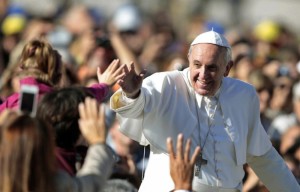
By Sarah Mac Donald - 28 November, 2017
 Pope Francis on Monday became the first pontiff to visit Myanmar.
Pope Francis on Monday became the first pontiff to visit Myanmar.
He is due to meet the country’s president and religious leaders over the next two days as well as Aung San Suu Kyi, the country’s de facto leader and a Nobel Peace Prize winner.
At Yangon airport on Monday afternoon, the Pope was greeted by schoolchildren dressed in traditional costumes as well as the country’s 22 bishops.
Ahead of his arrival, the Pontiff said little to journalists during his onboard meeting with them during the ten-hour flight from Rome, an indication of the sensitivity of the papal visit and concern that any mention of the plight of the Rohingya and their treatment by the military in Myanmar could ratchet up tensions in what is an already difficult situation.
The majority Buddhist nation has faced international condemnation over its persecution of the minority Rohingya Muslim population in Rakhine state.
In the traditional telegram sent by the Pope to the Italian President Sergio Mattarella on his departure from Italian soil, Pope Francis said he was going to Myanmar to “encourage the small but fervent Catholic community and meet believers of diverse religions.”
Ahead of the visit, Cardinal Charles Bo of Yangon advised Pope Francis not to use the word Rohingya while in Myanmar.
In an interview with Vatican Radio, he warned that the Pope “has to be very careful about what terms he will use” so “we request him to refrain from using the word Rohingya” because “this word is very much contested and not acceptable to the military, nor the government, nor the people in Myanmar”.
Myanmar is estimated to be about 90 per cent Buddhist. According to the Vatican’s 2015 statistics, the country has about 659,000 Catholics out of a population of some 52 million.
As many as 150,000 Catholics are expected to travel long distances to take part in the papal Mass on Wednesday, with trains hired to transport Christians from Kachin state in the north of the country for the two-day journey.
Almost immediately after his arrival, a change was made to the Pope’s schedule when a meeting with the country’s top military leader – the general responsible for the campaign against the Rohingya – was brought forward by three days.
The Pope met General Min Aung Hlaing for 15 minutes on Monday evening in what a Vatican spokesman described as a courtesy visit in which the Pope and the general “spoke of the great responsibility of the country’s authorities in this moment of transition”.
It was thus Pope Francis’ first official appointment in the country.
Min Aung Hlaing is in charge of military operations in Rakhine state, where security forces have launched a scorched earth campaign against Rohingya Muslims that has forced over 500,000 to flee to neighbouring Bangladesh in what the UN said is a campaign of ethnic cleansing.
While Myanmar began a slow process of introducing democratic reforms in 2015 after decades of military rule, the military still hold substantial power, including 25 per cent of the seats in parliament.
According to Cardinal Bo, in his Vatican Radio interview, the army still controls defence, border issues and home affairs, so Aung San Suu Kyi’s authority is “quite restricted and constitutionally she has no voice to speak against the army”.
Full diplomatic ties were established between the Vatican and Myanmar in May during a visit by Aung San Suu Kyi to the Vatican.
Following his visit to Myanmar, Pope Francis will travel to Bangladesh to meet Rohingya refugees.